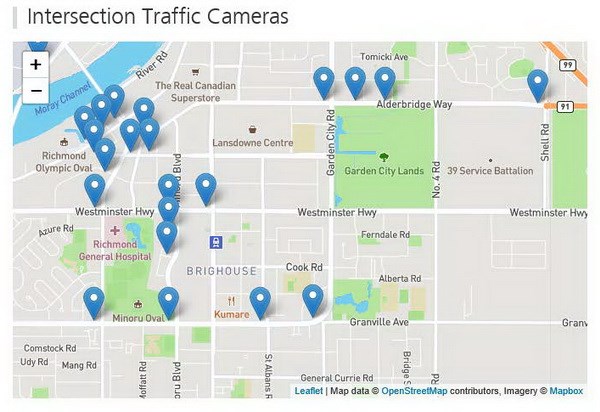Richmond’s new traffic cameras are being added to the Richmond RCMP’s list of tools to help maintain public safety.
For the past several months, the City of Richmond has been installing intersection video cameras at 110 major traffic intersections, which has been gradually going online since April 28.
However, Richmond RCMP will not have direct access to the cameras and won’t be using them for surveillance.
And, like any other businesses, the police will have to apply to purchase video footage from the cameras within 20 days of the recording day.
“This is an important advancement for public safety in our community, especially when it comes to road safety,” said Chief Supt. Will Ng with the Richmond RCMP.
“While they can offer evidence in a variety of investigations, video cameras are particularly useful in traffic collision investigations, which often rely heavily on witness statements and photographs taken after the fact.”
Ng added the access to video evidence will help improve police investigations and will encourage better driving habits in the community.
According to Mayor Malcolm Brodie in April, the closed circuit TV (CCTV) cameras are intended for road safety and traffic management uses, with the city working closely with the Office of the Information and Privacy Commissioner (OIPC) to make sure the cameras comply with privacy regulations.
Last spring, Meghan McDermott, a staff lawyer with the B.C. Civil Liberties Association (BCCLA) told the Richmond News that the issue of privacy in a public place is not black and white. However, various court decisions have shown that the public is allowed a certain level of anonymity even while in public.
McDermott said at the time that if faces and license plates weren’t blurred out from traffic camera data, the information could be used maliciously or just for general state surveillance.
“A lot of people live in the very frightening context of having a stalker or an abusive ex, somebody who would go to great lengths to figure out where they are and if they’re with other people,” McDermott told the News.
Cameras, she added, could also offend some people just by knowing they are being recorded and that the state has access to that footage.
Businesses and the public can apply to purchase video footage from the cameras to help with legal or other matters, such as collision evidence, according to the city.
Footage from the cameras will be purged after 30 days and won’t be available. Video footage will be $375 plus GST and a service charge per request.
With files from Kirsten Clarke, Maria Rantanen



